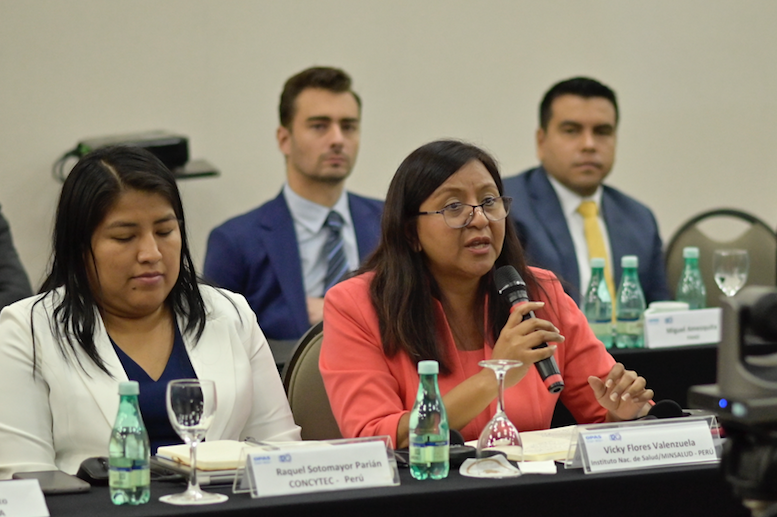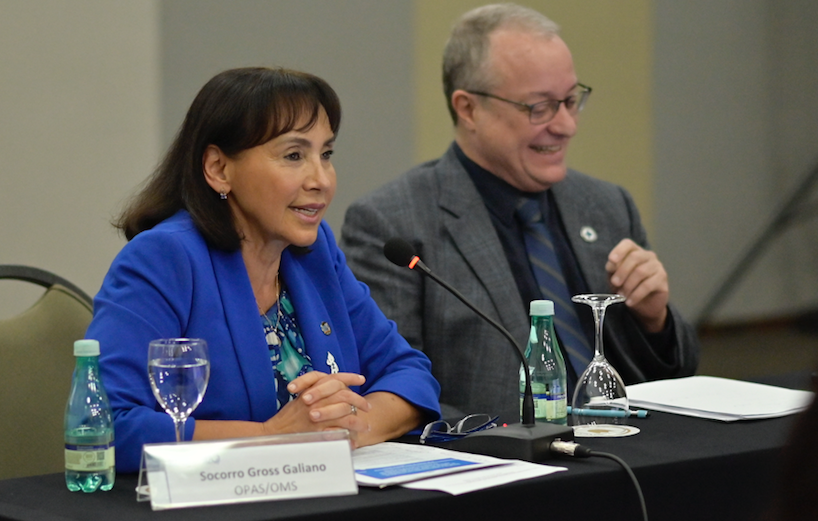
Brasilia, July 26, 2023 (PAHO/WHO) - The Pan American Health Organization (PAHO) held a multisectoral dialogue with governments, academia, civil society, and the private sector to discuss challenges and opportunities in strengthening value chains and foster collaboration among stakeholders to strengthen innovation, development, and production of vaccines and other technologies relevant to public health in Latin America and the Caribbean.
Representatives of thirteen countries of the Region participated in the dialogue: Argentina, Bolivia, Brazil, Chile, Colombia, Costa Rica, Cuba, Ecuador, Mexico, Paraguay, Peru, Uruguay and Venezuela. Representatives of business chambers, public manufacturers, financiers, and academia also participated.
The dialogue had four panels, designed to provide participants with the opportunity to discuss research and development, regulation, industrial policy instruments and articulation and integration of value chains for vaccines and other health technologies.
The chief a.i. of the Special Program for Innovation and Regional Production Platform of Medicines and Health Technologies (IMT/RP), Tomás Pippo, emphasized that Latin American and the Caribbean countries have to work together to strengthen value chains for the production of vaccines and other health technologies. He highlighted that all the actors have an opportunity to be inserted in the value chains and can be active participants by generating solutions for integration, forming strategic alliances, and complementing different capacities.
The multisectoral dialogues promoted by PAHO seek to create a favorable environment for debates, explore opportunities, map challenges, identify innovative solutions and promote the connection between actors in the ecosystem of innovation and production of vaccines and other health technologies.
According to secretary of Science, Technology, Innovation and Health Complex of the Brazilian Ministry of Health, Prof. Dr. Carlos Gadelha, the meeting was an opportunity to discuss ways for countries to overcome barriers to development. Prof. Dr. Gadelha emphasized that the knowledge and technology gap are one of the causes of regional inequalities and difficulties in access to health.
PAHO representative in Brazil, Dra. Socorro Gross, referred to the difficulties imposed by COVID-19, which led the Region to approach production from a new perspective, noting that the countries have made great efforts to ensure access to basic products. Dra. Gross also recalled that to face the challenges of the pandemic, PAHO offered countries the opportunity to purchase health products on a large scale, at affordable prices, through the Revolving Fund for Access to Vaccines and the Strategic Fund for joint purchase of essential medicines and strategic public health supplies.
Strengthening the integration of value chains in Latin America and the Caribbean is a strategic issue of great importance. In a region with more than 660 million inhabitants, there is a growing pharmaceutical industry with potential to contribute to the production of vaccines and other health technologies. However, there are challenges to overcome due to the regional reliance on essential imports from outside the region and the vulnerability of supply chains.
Prior to the meeting, PAHO held a workshop with representatives from Argentina, Brazil, Chile, Colombia, Costa Rica, and Mexico, to receive comments for an ongoing study of policy ecosystems to increase the production capacity of medicines, vaccines, and other technologies. The study aims to contribute to the development of policies that allow countries to respond adequately during a health emergency, as well as to produce medicines and other health technologies when necessary.
The workshop was conducted by the Research Group of the SUS Collaborating Center for the Evaluation of Technologies and Excellence in Health, part of the Federal University of Minas Gerais (UFMG).
This activity was made possible thanks to Global Affairs Canada (GAC).





